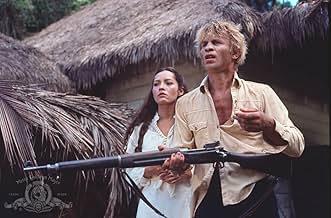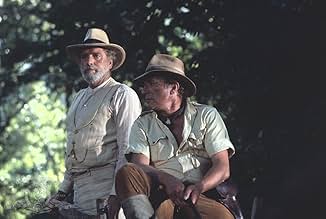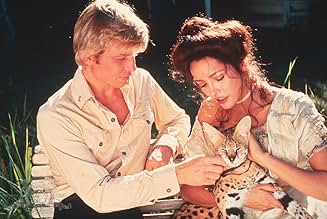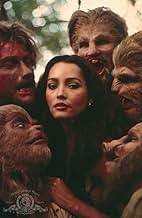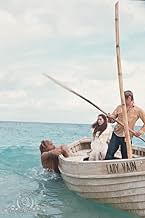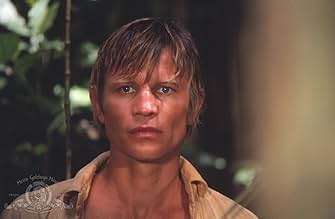AVALIAÇÃO DA IMDb
5,9/10
7,7 mil
SUA AVALIAÇÃO
Adicionar um enredo no seu idiomaA shipwrecked survivor discovers a remote island owned by a crazed scientist who is carrying out sinister experiments on the island's inhabitants.A shipwrecked survivor discovers a remote island owned by a crazed scientist who is carrying out sinister experiments on the island's inhabitants.A shipwrecked survivor discovers a remote island owned by a crazed scientist who is carrying out sinister experiments on the island's inhabitants.
- Direção
- Roteiristas
- Artistas
- Prêmios
- 6 indicações no total
Avaliações em destaque
My friend and I rented The Island of Dr. Moreau (1977). We both enjoyed it and thought the make-up was outstanding. There is some good acting and the story was close to Wells's novel. The remake was awful. This one is much better, so if you want to see a good science fiction movie rent this one. You won't be dissapointed. 7 out of 10.
Based on the excellent novel by renowned science fiction author H.G. Wells, this watchable and updated remake of the 1933 film starring Charles Laughton plays on the Frankenstein theme where man attempts to play God and improve upon Mother Nature. Andrew Braddock (Michael York) is a castaway of a shipwreck who serendipitously lands on an isolated island in the Pacific, and becomes the guest of the main inhabitant, Dr Moreau who appears seemingly hospitable enough at first. His other companions are ex-mercenary Montgomery (Nigel Davenport), and a beautiful yet emotionally distant woman Maria (Barbara Carrera),whom the doctor claims to have rescued from poverty from another country and brought up as his ward. Braddock's stay is normal albeit boring at first (not really much to do on an isolated island, is there?), then he begins to notice that things are not what they seem - the strange animal sounds that emanate from the forest at night, and the weird facial features of the servants who wait upon the doctor. His worst fears are confirmed when he encounters the results of the doctor's experiments - upright hairy creatures (who look like variations of the Wolfman of the old horror movies) that appear human and yet are not exactly men, though they wear clothing and can speak. He realizes that Dr Moreau is a madman doing modern Frankenstein-type experiments by messing up with the DNA of humans and animals, with Montgomery as a contemporary Igor - how the doctor obtains and maintains sterility of his concoctions and instruments without the benefit of refrigeration or sterilization in such primitive conditions is a moot point.
When Braddock protests at the cruel treatment of the creatures, Dr Moreau attempts to justify his experiments by explaining that by doing so, humanity would be benefited by elimination of birth defects and such, but Braddock is unconvinced.
Though they are repulsive-looking in appearance, the viewer can't help but sympathize with the plight of the "manimals", who live together in squalor in a dark cave, kept in line by The Laws established by Moreau - do not kill, do not shed blood, do not walk on all fours, etc. - repeated on an almost daily basis by their apparent leader the Sayer of the Law (Richard Baseheart), who looks the most "human" and "civilized" of the lot. Infractions of the Law results in being brought to the so-called House of Pain, where Moreau attempts to "correct" the miscreant and remind him that he is human and not animal.
The turning point in the film is when the Bullman (obviously originally a bison by the presence of a hairy hump on his back), having broken the law of shedding blood, attempts to flee rather than face punishment and is gunned down by Braddock. Yet despite having broken the law against killing, Braddock goes apparently unpunished, establishing in the minds of the other man-beasts of the unfairness of the Law - they seem to ask silently, why can this man kill and go scot-free and we can't?, and the eventual murder of Montgomery at the hands of Dr Moreau himself reinforces the double-standards of The Law in their eyes, and they eventually rise and revolt against the doctor, killing him, destroying the compound in which he lives in and setting it on fire. Ironically, it is this very act of staging a collective uprising which brings out the "humanity" of the creatures, as it shows that they can after all, think and plan and not merely act on their basic instincts, as the scenes where they suspend the doctor on a rope and systematically destroy the House of Pain and release the captive animals show. So in a way, Dr Moreau's experiments were not a total failure as he thought, they just didn't turn out the way he anticipated.
When Braddock protests at the cruel treatment of the creatures, Dr Moreau attempts to justify his experiments by explaining that by doing so, humanity would be benefited by elimination of birth defects and such, but Braddock is unconvinced.
Though they are repulsive-looking in appearance, the viewer can't help but sympathize with the plight of the "manimals", who live together in squalor in a dark cave, kept in line by The Laws established by Moreau - do not kill, do not shed blood, do not walk on all fours, etc. - repeated on an almost daily basis by their apparent leader the Sayer of the Law (Richard Baseheart), who looks the most "human" and "civilized" of the lot. Infractions of the Law results in being brought to the so-called House of Pain, where Moreau attempts to "correct" the miscreant and remind him that he is human and not animal.
The turning point in the film is when the Bullman (obviously originally a bison by the presence of a hairy hump on his back), having broken the law of shedding blood, attempts to flee rather than face punishment and is gunned down by Braddock. Yet despite having broken the law against killing, Braddock goes apparently unpunished, establishing in the minds of the other man-beasts of the unfairness of the Law - they seem to ask silently, why can this man kill and go scot-free and we can't?, and the eventual murder of Montgomery at the hands of Dr Moreau himself reinforces the double-standards of The Law in their eyes, and they eventually rise and revolt against the doctor, killing him, destroying the compound in which he lives in and setting it on fire. Ironically, it is this very act of staging a collective uprising which brings out the "humanity" of the creatures, as it shows that they can after all, think and plan and not merely act on their basic instincts, as the scenes where they suspend the doctor on a rope and systematically destroy the House of Pain and release the captive animals show. So in a way, Dr Moreau's experiments were not a total failure as he thought, they just didn't turn out the way he anticipated.
I watched this movie by accident, due to a last-minute program change by the TV station. I had missed the first couple of minutes including the title, so I was just as unprepared as the shipwrecked Andrew (Michael York) when he set foot on this beautiful tropical island. To his horror, he finds out that an aging scientist, presumed long dead by the world, has populated the island with his "children," the results of his experiments in combining human and animal genes. What I found most astonishing was the authentic feel to the characters. Starting with Andrew. His initial repulsion develops into a discerning appreciation, without ever condoning the monstrosity of Dr. Moreau's project. The old scientist himself (Burt Lancaster, a rather shallow performance in comparison) is not an evil lunatic but a genius who got carried away, convinced to the end of his own noble goals and best intentions. However, the most amazing aspect is the differentiated portrayal of Moreau's more or less "successful" creatures. The movie manages to make your heart go out for them in their struggle to be human against their nature. The most poignant moment is the Lionman's farewell cry for his Master. An overall very satisfying movie, despite some weaknesses in the development of the plot towards the end (it feels like the director suddenly ran out of time). Quality science-fiction with good entertainment value. 7/10
8Omne
I recently saw this version of The Island of Dr. Moreau for the first time courtesy of MGM Midnite Movies.
It was much better than I thought it would be. Of course that was mainly due to the fact that I had already seen the abomination made in 1996 starring Brando and Kilmer. After seeing that mess I had pretty low expectations for this one. I was pleasantly surprised by the acting, yes even Michael York's, as well as the make-up.
Barbara Carrera was beautiful as always even though her character seemed to be more window dressing then integral to the plot. I'm not complaining mind you, she makes lovely window dressing.
Lancaster did an excellent job as Moreau. His subdued, scientific detachment fit the part perfectly and it was interesting as he started going over the edge towards the end of the movie.
York managed a very good scene when he, as he was changing into an animal, managed to remember things from his childhood as he desperately tried to keep his identity and humanity.
Not the best movie that I've seen but it's in the top 10% or so. After watching this version it makes me even more appalled at the 1996 disaster. It's too bad that a lot of people now have an idea of what Island of Dr. Moreau based on that version instead of on this one.
I'd give it an 8 out of 10.
It was much better than I thought it would be. Of course that was mainly due to the fact that I had already seen the abomination made in 1996 starring Brando and Kilmer. After seeing that mess I had pretty low expectations for this one. I was pleasantly surprised by the acting, yes even Michael York's, as well as the make-up.
Barbara Carrera was beautiful as always even though her character seemed to be more window dressing then integral to the plot. I'm not complaining mind you, she makes lovely window dressing.
Lancaster did an excellent job as Moreau. His subdued, scientific detachment fit the part perfectly and it was interesting as he started going over the edge towards the end of the movie.
York managed a very good scene when he, as he was changing into an animal, managed to remember things from his childhood as he desperately tried to keep his identity and humanity.
Not the best movie that I've seen but it's in the top 10% or so. After watching this version it makes me even more appalled at the 1996 disaster. It's too bad that a lot of people now have an idea of what Island of Dr. Moreau based on that version instead of on this one.
I'd give it an 8 out of 10.
... although any limitations on what could have been shown or done were much more lax in this film 44 years later. Yet I just like the original better.
This is another take on the H. G. Wells novel about the "mad" scientist experimenting with animals on a South Seas island, performing surgery on them in "the House of Pain" to try to transform them into human beings. Of course, things never go as planned in these films. Moreau is, after all, "tampering in God's domain" (though that hoary old expression is mercifully not used in this film).
Difficult to not compare this version to the first adaption, 1933's Island of Lost Souls, which I find far more satisfactory. In the original Charles Laughton brought a creepy, perverse quality to his Moreau. He was unsettling but effective, and when he cracked that whip in the "What is the law?" scene with the man beasts there was more than a hint of the sadist about him.
The surprising casting of Burt Lancaster as Moreau in the 1977 version fails to bring any of these same odious qualities to the film. It's difficult to work up much of a dislike for Lancaster's scientist in spite of his activities. He's still Burt, and he has to battle against his good guy screen persona.
Island of Dr. Moreau also surprisingly jettisons one of the kinkiest aspects of the 1933 film, the Panther Girl, as originally played by Kathleen Burke, his most near perfection human like creation from a beast, with whom Laughton's Moreau is eager to see if an unsuspecting male shipwrecked on his island (Richard Arlen) will be willing to mate.
The '77 version does have beautiful Barbara Carrera slinking around, and she certainly intrigues (well, more than intrigues) Michael York, now in the Arlen role. Lancaster is aware that they are sexually attracted to each other and ready to mate - but to what purpose, since it turns out Carrera is a normal human, and no kind of Panther Girl. There is a hint in her final scene, however, that she may not be quite so normal, after all, but it went by so quickly I wasn't quite certain if it was my imagination.
The man beasts in the original are more effective than here. For starters, you didn't get a really good look at the makeup in the original (outside of a closeup of Bela Lugosi), so much of it is left to the audience's imagination. In the '77 version you see the makeup and, to be honest, it's not so much frightening as it is artificial in appearance (on about a par with that to be found in the original Planet of the Apes).
The '77 version, however, interestingly, does show what happens to the man beasts after everything blows up on the island, something the '33 original left to our imagination. This version also has Moreau strapping down and experimenting with York, something not done in the '33 version. That is one of the more interesting aspects of this production, as well.
In the final analysis, this is a fairly mediocre adaption of the Wells story, but one should still see it to make his own assessment. There would be another version with Brando almost 20 years later, of course. It's been too long since I've seen that version to talk about it, though I do recall disliking it at the time.
This is another take on the H. G. Wells novel about the "mad" scientist experimenting with animals on a South Seas island, performing surgery on them in "the House of Pain" to try to transform them into human beings. Of course, things never go as planned in these films. Moreau is, after all, "tampering in God's domain" (though that hoary old expression is mercifully not used in this film).
Difficult to not compare this version to the first adaption, 1933's Island of Lost Souls, which I find far more satisfactory. In the original Charles Laughton brought a creepy, perverse quality to his Moreau. He was unsettling but effective, and when he cracked that whip in the "What is the law?" scene with the man beasts there was more than a hint of the sadist about him.
The surprising casting of Burt Lancaster as Moreau in the 1977 version fails to bring any of these same odious qualities to the film. It's difficult to work up much of a dislike for Lancaster's scientist in spite of his activities. He's still Burt, and he has to battle against his good guy screen persona.
Island of Dr. Moreau also surprisingly jettisons one of the kinkiest aspects of the 1933 film, the Panther Girl, as originally played by Kathleen Burke, his most near perfection human like creation from a beast, with whom Laughton's Moreau is eager to see if an unsuspecting male shipwrecked on his island (Richard Arlen) will be willing to mate.
The '77 version does have beautiful Barbara Carrera slinking around, and she certainly intrigues (well, more than intrigues) Michael York, now in the Arlen role. Lancaster is aware that they are sexually attracted to each other and ready to mate - but to what purpose, since it turns out Carrera is a normal human, and no kind of Panther Girl. There is a hint in her final scene, however, that she may not be quite so normal, after all, but it went by so quickly I wasn't quite certain if it was my imagination.
The man beasts in the original are more effective than here. For starters, you didn't get a really good look at the makeup in the original (outside of a closeup of Bela Lugosi), so much of it is left to the audience's imagination. In the '77 version you see the makeup and, to be honest, it's not so much frightening as it is artificial in appearance (on about a par with that to be found in the original Planet of the Apes).
The '77 version, however, interestingly, does show what happens to the man beasts after everything blows up on the island, something the '33 original left to our imagination. This version also has Moreau strapping down and experimenting with York, something not done in the '33 version. That is one of the more interesting aspects of this production, as well.
In the final analysis, this is a fairly mediocre adaption of the Wells story, but one should still see it to make his own assessment. There would be another version with Brando almost 20 years later, of course. It's been too long since I've seen that version to talk about it, though I do recall disliking it at the time.
Você sabia?
- CuriosidadesDuring the fight between the bullman and the tiger, the animal actually took the stuntman's head in his jaws. Luckily he was wearing a fiberglass helmet which protected him.
- Erros de gravaçãoDuring the opening scene when the boat is being pushed ashore you can see the shadow of the boom mic in the water's edge.
- Citações
Sayer of the Law: [about Moreau] His is the hand that makes. His is the hand that hurts. His is the hand that heals. His is the House of Pain. His is the House of Pain. His is the House of Pain. He who breaks the law shall be punished back to the House of Pain.
- ConexõesFeatured in A Century of Science Fiction (1996)
- Trilhas sonorasDer Vogelfänger bin ich ja
(Papageno's Aria from "Die Zauberflöte" K.620)
Written by Wolfgang Amadeus Mozart
Principais escolhas
Faça login para avaliar e ver a lista de recomendações personalizadas
Detalhes
- Data de lançamento
- País de origem
- Central de atendimento oficial
- Idioma
- Também conhecido como
- The Island of Dr. Moreau
- Locações de filme
- Empresas de produção
- Consulte mais créditos da empresa na IMDbPro
Bilheteria
- Orçamento
- US$ 6.000.000 (estimativa)
Contribua para esta página
Sugerir uma alteração ou adicionar conteúdo ausente


